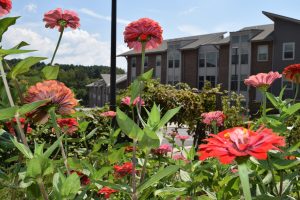
Ezra Maille
News Staff Writer
[email protected]
Students and staff encourage students to grow sustainability efforts on campus, despite current endeavors.
Madison Carson, the manager of the Castanea Garden near the Sherrill Center, said her garden is a permaculture system. She said this particular garden is more permanent and contains perennials, also known as fruit-bearing trees.
“Within this garden we try to build ecological relationships between the plants and the animals that live here,” the art and ecology double major said.
According to Carson, it’s important now more than ever to be able to grow your own food. She said it’s a simple way to lower your carbon footprint as well as build ecosystems that benefit many different types of plants.
“There are a lot of issues going on in the world right now, especially to do with our environment, and I think that gardening is really cool because it’s one way people can actively take a stance to minimize environmental impacts,” Carson said.
Dee Eggers, an associate professor of environmental studies at UNC Asheville, said the university has improved some of its procurement. This includes reducing the amount of paper we buy as well as improving energy efficiency.
“As a university we should go, at minimum, carbon-neutral, preferably carbon negative,” Eggers said. “That is to say, offset more carbon going into the atmosphere than we are responsible for putting in, directly and indirectly.”
UNCA is the first school in the UNC system to divest partially from fossil fuels, according to Eggers. She said the university can also take simple steps to reduce the overall carbon output such as planting more trees on campus as well as supporting similar initiatives on other properties.
“Our direct emissions aren’t very much, but the electricity we use has carbon behind it. Every piece of paper we buy has carbon behind it. So we need to get a good handle on what actually is our carbon footprint,” Eggers said.
According to Carson, many students don’t know much or anything about campus sustainability practices. She said when it comes to the edible food gardens, she wishes students were more involved.
“We are an environmentally conscientious university but there are always things we can do more of,” Carson said.
Tallis Monteiro, the manager of Sol Garden behind Brown Dining Hall, said her garden is experimenting with different techniques and gardening processes in an attempt to regenerate the soil after all the construction that’s been going on.
“I had little experience with gardening in the past,” Monteiro said. “When I saw that UNCA had a Student Environmental Center and student gardens, I was super interested in how that worked and how I could become a part of that.”
Monteiro said she likes that UNCA is an “edible” campus. She said the university allows for many locations around campus for food to be grown simply for the enjoyment of the students.
“Our food is for students who are passing by to take as long as they follow sustainable harvesting guidelines,” Monteiro said. “Leaving some on the tree, not taking everything that you see.”
Monteiro said the SEC puts on events around campus to encourage students to be more proactive and engaged with sustainability. She said the largest of these functions, Greenfest, has many events ranging from making clay birdhouses to learning about simple sustainable principles. According to the UNCA website, Greenfest is a semi-annual event series taking place in September and March and includes a farm to table dinner on Sept. 23.
“I think it’s really powerful to be able to grow your own food,” Monteiro said. “We all need to eat.”
Carson said the best place to enjoy the food grown on campus is at the farm to table dinner, where on-campus gardens will provide roughly 60 to 80 pounds of produce for the event.
“I think we are doing a lot when you compare our campus to a lot of different campuses in the U.S.,” Monteiro said. “But we can definitely be doing more.”

















